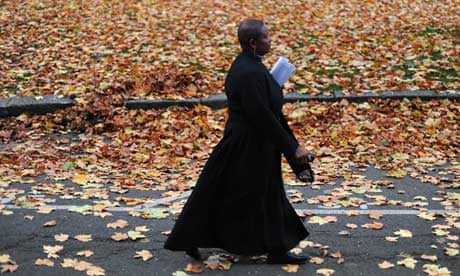On Friday afternoon, the Church of England's General Synod will descend on York to begin the Herculean task of clearing away some of the debris from its last meeting eight months ago. The synod's failure in November to approve draft legislation that would have allowed female clergy to become bishops was memorably described by one member as "a train crash of epic proportions". Few would disagree.
The rejection of the legislation, by a mere six votes, was a disaster for the church, laying bare yet again many of the divisions that dogged Rowan Williams' time as archbishop of Canterbury. Equally strikingly, it emphasised how out of step the church was both with contemporary society and even today's Tory high command.
"I think it's important for the Church of England to be a modern church in touch with society as it is today and this was a key step it needed to take," said a plainly miffed David Cameron, who urged the church to "get on with it".
But the recriminations did not end there. Philip Giddings, the conservative evangelical chair of the house of laity – which makes up a third of the synod – was accused of causing the church "reputational damage" by using his role to speak against the proposals at synod. After surviving a vote of no confidence in his leadership in January, he promised to listen to those with whom he disagreed and expressed the hope that "the temperature" of the debate could be lowered.
Since then, the house of bishops has agreed to let senior female clergy attend and speak at its meetings until women are legally permitted to become bishops, and come up with a series of possible fixes to the vexed issue.
With parliament breathing down its neck and many angered by the church hierarchy's opposition to same-sex marriage, the C of E knows it cannot risk another embarrassing meeting.
Lest there be the slightest residual doubt as to the necessity of a quick fix on women bishops, the synod's general secretary was only to happy to spell things out a fortnight ago. "One train crash is extremely bad; two would be quite unacceptable," said William Fittall. "I think everybody wants to do this as quickly as possible."
On Friday evening, Justin Welby, enthroned as the 105th archbishop of Canterbury at the end of March, will address his first synod. Even for a man who has travelled to some of the most dangerous places on earth in the hope of bringing about peace and reconciliation, the five-day meeting will be a tough gig. Earlier this month, a Church of England priest was reprimanded for taking to Facebook to criticise Welby's opposition to same-sex marriage, calling him "a wanker", "a homophobic, hypocritical bigot" and perhaps "the most boring, dullest, uncharismatic ABC for the past 100 years".
The next morning, two hours after holy communion in the Central Hall, the synod will meet privately – far from the prying eyes of press and public – to discuss the issue of women bishops. It promises to be a lively affair and the opposing factions are already well dug in: the pro-women bishops lobby are thrilled with the option to be put to the synod, which would see "a measure and amending canon that made it lawful for women to become bishops", and "the repeal of the statutory rights to pass Resolutions A and B under the 1993 Measure." In other words, a simple legal way to ensure women bishops by 2015. Opponents, however, feel they are being painted into a corner.
The Rev Canon Rosie Harper, a jobbing vicar in Great Missenden and chaplain to the bishop of Buckingham, is delighted with the proposals, but fears another clash is looming. "From the women's point of view, if what the bishops have offered were to go through, we'd be very happy with that," she said. "But from the point of view of people who want to keep women in their place, it's hard to see how they could be tempted to vote for it." The success of the enterprise, she added, hinges on mutual trust – "but at the end of the November synod, we were all left with such a low degree of trust that it feels like a big ask".
On that at least, Harper and her opponents can agree. "We're going into synod very concerned, really, because the motion put forward by the house of bishops offers us considerably less than was voted down last November," said Rod Thomas, vicar of St Matthew's Elburton, Plymouth, and chairman for the chair of the conservative evangelical group Reform. He, too predicts a stormy session. "We've accepted that there will be women bishops but the issue is how they're going to be introduced," he said. "Is it going to be in away that keep us all together or is it going to be in a way that ultimately drives us out? If you know that what's on the table is ultimately going to drive you out of the Church of England – not overnight, but over time – you've got nothing to lose."

Comments (…)
Sign in or create your Guardian account to join the discussion